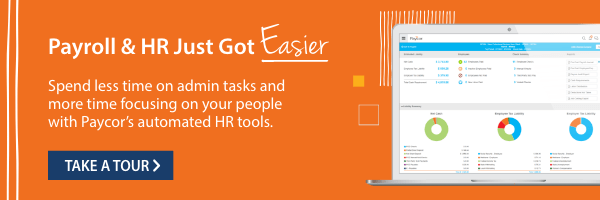We’ve all been there. It’s performance review time again, and you’re desperately searching for what you wrote last year to find inspiration. You’ve got the required forms, your notes, and your employee’s 360-degree feedback.
The date is approaching, and in your opinion, you’ve set yourself up for a successful evaluation. But is your employee set up for success? When it comes to sharing feedback—negative or positive—the delivery can determine whether your employee leaves the meeting motivated or disengaged.
You certainly don’t want to overdo the praise and leave out critical growth opportunities. You also don’t want to make the employee feel terrible about the things that need to change. Sure, you might know what you’re going to say, but do you know how you should say it? This handy performance review template can help.
Read on for more performance appraisal examples, tips for writing a performance review, and more.
What is a Performance Appraisal?

A performance appraisal is just another term for a performance review. By definition, it’s the act of assessing an employee’s performance. Your organization might use an appraisal form that accompanies an annual meeting. Or you may use software to assist. Although methods have evolved for some, the performance appraisal has three basic functions, according to the Harvard Business Review:
- To provide adequate feedback to each person on their performance.
- To serve as a basis for modifying or changing behavior toward more effective working habits.
- To provide data to managers with which they may judge future job assignments and compensation.
There’s a lot riding on the performance appraisal for both parties—from increased compensation to more high-profile assignments in the future. So, when it comes to talking through feedback with your employees, it should be honest, unbiased, and direct. Feedback shouldn’t discourage the employee but instead propel the employee forward.
Chances are you already have a form that dissects performance into critical categories relevant to your workplace. Just in case you don’t, here are a few topics to focus on in a performance appraisal:
- Innovation
- Communication
- Accountability
- Professionalism
- Productivity
- Achievement
- Problem-Solving
Importance of Performance Appraisals

Performance appraisals benefit both the employee and the organization. Here’s how:
For Employees
Regular feedback helps employees gauge their progress, identify skills gaps, and create focused development plans. When done effectively, appraisals boost confidence by highlighting growth and providing the guidance needed to advance professionally. They also create a dedicated space for employees to voice their challenges, aspirations, and ideas, ultimately empowering them to take ownership of their career trajectory.
For Organizations
Performance appraisals offer systematic ways to align individual efforts with business objectives. They create accountability and provide data-driven insights for talent management decisions, including promotions, compensation adjustments, and team assignments.
Effective appraisal processes enhance retention by demonstrating investment in employee growth and development. They also help identify high-potential talent and succession planning candidates while revealing patterns in performance that can inform organizational learning initiatives and process improvements.
Delivering Performance Appraisal Feedback

Good feedback should affirm positive performance and make employees consider what can be done in the future to move to the next level in their career paths. When delivering feedback, you should:
- Acknowledge an employee’s psychological needs, including feelings of autonomy and sense of belonging. Also, assure the employee their work has value.
- Be objective and ensure you separate emotions from feedback.
- Focus on how performance relates to the employee’s job description and goals. Discuss the ways in which the employee can move forward.

What is Performance Bias?
Performance biases occur when you make an assumption about an employee based solely on stereotypes. Avoid biases with these tips.
Writing an Employee Performance Appraisal
Nobody said writing performance appraisals would be easy, but these tips will help:
Make it Regular
Whatever your current performance appraisal cycle, making it more regular will help. You won’t be trying to cover so much, so it’ll take less time to prepare. A 90-day performance review cycle can work, but monthly is even better. The goal is for the process to become more of a continuous back-and-forth conversation, where you’re always targeting new areas for improvement.
Begin with Wins
It always pays to start a performance appraisal on a positive note. If an employee has achieved literally nothing, they should be on a performance plan. Even if you’re going to move on to criticism, reminding an employee of what they have achieved with your company sets the right tone.
Listen!
Traditional performance management often fails because it’s a one-way conversation. Here’s a secret: you can ask employees how they feel they’re performing. Understanding their challenges enables you to better target your feedback. When employees take time to reflect on their own performance, they may also be more receptive to what you have to say.
Be Specific
Whenever you can, use concrete examples. It’s true for positive feedback: Putting a number on how much an employee has contributed adds power to praise. But specificity is even more important for criticism. Employees can only understand where they can improve with reference to actual situations.
Be Future-Focused
While acknowledging past performance is important, effective reviews look forward. Frame feedback as opportunities for growth rather than dwelling on mistakes. Discuss how strengths can be leveraged and how challenges can be addressed proactively.
Set Measurable Goals
Establish clear, achievable objectives with specific metrics and timelines. Well-defined goals provide direction and a framework for evaluating future performance. Ensure goals are challenging yet attainable to maintain motivation.
Align with Company Vision and Values
Performance appraisals should never be written in a vacuum. It’s not all about you and your direct report. You need to ask how you both fit within the overall business. An employee’s actions should be judged by how they align with company core values, and goals you set should be oriented toward the organization’s overall vision.
Use 360 Feedback
Why rely on one person’s perspective when you’re part of a team? Great performance counseling and management includes the impressions of multiple team members. Employees should be evaluated not just by their managers, but by their peers, teammates, and their own direct reports. This way, you’ll get a more rounded picture of how an employee performs day-to-day.
Common Challenges and Solutions

Despite best intentions, performance appraisal often encounter roadblocks that can diminish their effectiveness. Being aware of these challenges and having strategies to address them ensures performance conversations remain productive and meaningful. Here are two common hurdles and practical approaches to overcome them.
Addressing Bias
Performance reviews are vulnerable to various cognitive biases that can undermine their fairness and effectiveness. Common biases include recency bias (overemphasizing recent events), similarity bias (favoring those similar to ourselves), and halo/horn effects (letting one characteristic influence overall assessment), among others.
Combat these tendencies by using structured evaluation criteria, collecting specific behavioral examples throughout the review period, and seeking multiple perspectives through 360-degree feedback. Consider implementing bias training for reviewers and having draft reviews checked by HR or a second manager. Using calibration sessions where managers discuss assessments as a group can also help identify and correct inconsistencies in standards or ratings.
Overcoming Demotivation
Even well-intentioned feedback can sometimes leave employees feeling discouraged. To maintain motivation during a performance appraisal, balance constructive criticism with genuine recognition of strengths and progress. Frame development areas as growth opportunities rather than failures and involve employees in creating their improvement plans.
Follow up regularly after reviews to provide support and recognize incremental improvements. Remember that how feedback is delivered matters as much as its content. Maintain a coaching mindset rather than a judging one and demonstrate confidence in the employee’s ability to succeed.
31 Performance Appraisal Examples & Phrases

Here are some examples of appropriate phrases for delivering performance appraisal feedback:
1. Quality Of Work Performance Review Phrase
John, we appreciate all the work you did to assemble data for the annual report. This was the first year we’ve been able to share in a digital format! As we discussed earlier, one of the board members discovered some inaccurate information that could have been damaging if published. What measures have you put in place to avoid these kinds of mistakes in the future?
2. Performance Feedback
We received great feedback from your clients about you. We are incredibly grateful you are part of the team. According to our reports, you’ve exceeded your goals for the year already. What knowledge are you sharing with the team about how to replicate this success, and what do you intend to accomplish in the next quarter?
3. Initiative Performance Review Feedback
In this role, you created a process where there wasn’t one before. Our productivity is much higher thanks to your contributions. Please continue to speak up when you see opportunities for us to improve.
4. Skills/Opportunity Feedback
Donald, you are extremely enthusiastic about your work, and your energy is infectious. Some of our clients ask for you, which is rare in the pest control industry. Have you ever considered taking on a training role to share some of your tips for building rapport with customers and providing stellar customer service?
5. Performance Feedback Or Needs Assessment
Velma, your project feedback for residential jobs is great, but there are some opportunities for improvement when it comes to commercial jobs. Would you like to discuss your preferences so that we can give you more assignments where you’ll thrive?
6. Misaligned Skills Feedback
Winnie, you are known for your kindness by everyone who meets you. However, this sales position requires more determination and a competitive spirit. What are your goals for this role? Would you like to explore other options within the company that might be better suited?
7. Work Performance & Execution
Maria, your attention to detail on the quarterly reports has been outstanding. You consistently catch errors that others miss, and your ability to meet tight deadlines without sacrificing quality is impressive. The executive team specifically mentioned how clear and actionable your latest analysis was. I’d encourage you to keep sharing your process with the rest of the team—your approach sets a great standard for work execution.
8. Work Completion
James, you always see projects through to the end, even when unexpected challenges pop up. The recent inventory update is a great example—you handled every step and made sure we hit our deadline. That said, I noticed a few minor tasks lingered before being fully closed out. What systems can you put in place to ensure all project details are wrapped up promptly in the future?
9. Time Management
Priya, you consistently complete your assignments ahead of schedule, which helps the team stay on track. There were a few instances last month where overlapping deadlines seemed to cause a time crunch. How might you prioritize or delegate tasks differently next quarter to maintain this strong performance without last-minute stress?
10. Attention to Detail
Sophie, your careful eye catches mistakes that others miss, and your edits have improved our materials. On the last project, there were a couple of formatting inconsistencies that slipped through. Is there a checklist or process you could implement to help ensure everything is double-checked before final submission?
11. Project Management
Ethan, you broke the software rollout into clear milestones and kept everyone on track. The project wouldn’t have launched on time without you. Going forward, how can you involve more team members in the planning phase so knowledge is shared and others develop project management skills as well?
12. Resourcefulness
Carlos, when our supply order was delayed, you quickly found local vendors so production could keep moving. Your solutions have saved us time and money. For next quarter, could you document some of these backup strategies so others can use them when you’re out?
13. Growth, Development & Leadership
Amira, you’ve taken on more responsibility and it shows. Your willingness to guide new hires is appreciated. As you continue to grow, what leadership skills or formal training would you like to pursue this year to prepare for a potential management role?
14. Mentorship
Julia, you’re the go-to for technical questions, and your patient explanations help others grow. I’d encourage you to schedule regular check-ins with junior staff to formalize this mentorship and track their progress together.
15. Engagement
DeShawn, your enthusiasm at meetings is contagious, and you always volunteer for new initiatives. Sometimes, though, it seems like you take on too much at once. How can you prioritize your commitments so your energy stays high and your contributions remain focused?
16. Strategic Thinking
Morgan, your suggestion to target a new market segment was based on solid research and is already paying off. For the next two quarters, can you outline a roadmap and set specific milestones to measure our progress in this area?
17. Collaboration & Interpersonal Skills
Ava, you bring people together and help the team reach consensus. There have been a few tense moments where team disagreements lingered. What steps could you take to facilitate follow-ups and ensure everyone feels heard after meetings?
18. Teamwork
Liam, you’re always willing to help others, even outside your official responsibilities. I’d challenge you to lead a group project next quarter and share your approach to teamwork, so others can learn from your example.
19. Relationship Building
Zara, you’ve built strong relationships with both colleagues and clients. As we expand, how can you help onboard new clients and introduce them to our company culture, ensuring that these relationships start off just as strong?
20. Communication
Ben, your project updates are clear and concise, which helps everyone stay aligned. In the last sprint, a few stakeholders mentioned they’d like more frequent updates. How could you adjust your communication rhythm to keep all parties fully in the loop?
21. Decision Making
Maya, you gathered the facts and proposed a workable solution during our recent process issue. I’d love to see you document your decision-making process and share it with the team, so others can learn from your approach.
22. Problem-Solving
Omar, your troubleshooting during the product recall was invaluable. A few solutions were implemented quickly but needed tweaks later. What can you do to test your solutions on a small scale before rolling them out more broadly?
23. Creativity in Problem-Solving
Sienna, your creative ideas drove the success of our social media campaign. Since then, we’ve relied heavily on your input. How about leading a brainstorming session next month to help others tap into their creative side and diversify our approach?
24. Data-Driven Decision Making
Raj, your analysis on customer trends helped us make informed choices. For the upcoming campaign, could you identify two or three key metrics we should track from the start to evaluate our progress more effectively?
25. Accountability & Professionalism
Elena, you take ownership of your work and address mistakes openly. To set an even stronger example, how could you help develop a system for team accountability, so everyone feels empowered to own their results?
26. Reliability
Tom, your colleagues know they can count on you to deliver what you promise. This is a great strength. As we add more projects, would you be open to training others on your organizational strategies to help them become more reliable too?
27. Work Ethic & Dedication
Megan, your dedication and willingness to take on extra work during busy periods is motivating. To avoid burnout, what boundaries or support systems would help you sustain this level of effort over the long term?
28. Achievement
Isaac, your work brought in our biggest client this year. Now, I’d like to see you mentor a colleague on your sales strategies and set a stretch goal for your next big win.
29. Client & Customer Relations
Tara, clients regularly mention your professionalism and responsiveness. For the next quarter, could you gather feedback from clients on how we can further improve our services and share your findings with the team?
30. Client Relations
David, you maintain proactive contact and keep accounts healthy. In the next review cycle, can you outline a plan to deepen client engagement—perhaps by hosting a quarterly check-in or sharing industry updates?
31. Customer Service Excellence
Emily, your patience and empathy with customers leads to repeat business and positive reviews. I’d encourage you to lead a training session for new hires on handling difficult customer interactions, and maybe track customer satisfaction scores to measure impact.
Performance Appraisals vs. Performance Management

Performance appraisals typically only happen once a year, while performance management is an ongoing, year-round process. Annual reviews force us to rely on our memory and are subject to recency bias.
If you believe the annual performance appraisal process in your organization could be improved with more frequent feedback, performance management software can help. Paycor’s Talent Development solution makes this possible with:
- Automated workflows so your people can focus on coaching, not unnecessary admin
- Customized templates to help managers make the most out of 1:1s with direct reports
- Feedback tools facilitating conversation between peers, teams, and supervisors
- Integrated goal-setting features designed to supercharge employee efficiency
- Easy access to historical feedback, boosting accountability and reducing bias
How Paycor Helps
Paycor’s Talent Development software fosters a culture of feedback, employee recognition, and team spirit. Managers can use these tools to track key metrics, evaluate employee performance, and upskill their teams. Employees can go online and recognize each other, share feedback in a psychologically safe environment, and review their own progress.
Our suite of HCM software is purpose-built for leaders. With Paycor, you can operationalize every aspect of people management—including how you celebrate each win.
Learn more with a guided product tour.









